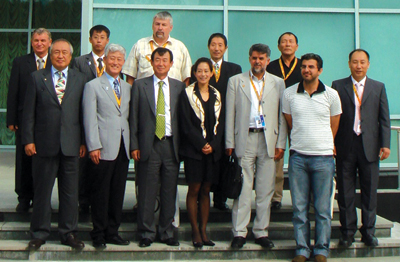Vice-president of IBU Shares Secrets of Success

Streets around the world were occupied by parades and voices shouting for women’s rights to celebrate the 99th International Women’s Day on March 8. The day commemorates the day when American women labors working in the textile industry demonstrated, urging political equality and the right to form a labor union, 90 years ago. Since then, women’s rights and status have gradually improved. However, the reality is still harsh. Women continuously face invisible barriers continuously as they start their public life, especially in fields which tend to be considered as a world of men. But there is always a place for hope as women start to break down those remaining walls as well.
To commemorate International Women’s Day, the Ewha Voice interviewed Kim Nami, (’93, Exercise, Sport & Leisure Science), one of the few woman pioneers in the world of sports.
At the beginning of February, residents of Pyeongchang, Gangwon province, gathered together to greet the International Olympic Committee (IOC) delegates visiting the city to inspect its bid for the 2014 Winter Olympics. Pyeongchang had fallen second to Vancouver, Canada by only three votes in its bid to host the Games in 2010, so every preparation was made for the four-day visit of the inspectors, and professionals from related fields were called to assist in the event. Among those in charge of introducing the facilities to the visitors stood Kim Nami, the youngest woman and the first Asian woman to become a vice-president of the International Biathlon Union (IBU). Kim was in charge of explaining the Biathlon stadium.
Biathlon, meaning a game played by two, is a winter sport where athletes cross country ski for a distance then stop and fire a rifle at a target. It was first introduced in
Kim herself was not a biathlete, but a skier. However, after a career that included 88 wins in national competition, it was the biathlon that she chose to fall in love with.
“It may seem difficult to be engaged in a sport different from the one I did all my life, but there is a great similarity between skiing and the biathlon. To me, skiing is like my family home and the biathlon is my husband’s home,” said Kim.
Kim’s career as an athlete goes back to 1970s when she went to
Like her long relationship with sport, Kim’s relationship with Ewha starts from her childhood as well. When she was growing up in
Her position with the IBU came by chance. When she was working as a member of Korea Ski Association in 2003, she was asked to serve the IBU members who were visiting
To mention a few of Kim’s other current positions, she is International Director of both Biathlon Union of Korea and Korea Ski Instructors Association, and a member of 2014 Pyeongchang Winter Olympic Games Bidding Committee. She is also a mother of a 7-year-old boy. Because of her heavy schedule, she has been in
However, the real key to Kim’s success is revealed as she answers her phone, which has been ringing continuously during the interview, speaking fluently in German. Kim can speak five different languages which she has learned through continuous practice. Kim says in order to work in the global arena, language is a primary necessity. “Speaking fluently is also important; however just by knowing the greeting words in another language, you can break the wall that exists between you and others and place yourself closer to them,” she says. Thus, Kim always takes time to learn more of the language of a country she plans to visit. Currently, she is studying English twice a week.
Working as one of the few women in the international arena of sports, words like “the first” and “the youngest” always follow Kim in front of her titles. However, Kim says she has never faced any hardships as a woman and believes that working in the global stage is the main reason that led her to today’s position. “I was able to use all my strengths because I was one of the few women working in this field, where I am treated equally and fairly regardless of my young age.”
Kim also finds her previous career as an athlete very helpful to her current position because she can understand other athletes well. “Whenever I see skiers waiting for the signal at the starting line, I get nervous as if I, myself were a competitor and I feel like I have to actually start skiing when the race starts,” says Kim.
Although the biathlon may yet be unfamiliar to many Koreans, Kim is passionate about publicizing it. “Koreans have favorable physical conditions for competing in the biathlon. Koreans are good at the marathon, archery, shooting and skiing, which are all included in the game. Thus there is a high possibility of not only cultivating promising players but also of making it a national sport that everyone can enjoy regardless of age and gender,” she says.
Naturally, she dreams of seeing Korean biathletes winning international competitions. Tears brim up in her eyes while she says, “I now give medals to athletes from other countries, but when Korean athletes finally stand on the podium, I know I will be happier than the winners themselves.”
Kim sees good chances for Pyeongchang to host the Olympic Winter Games in 2014. “Personally, I actually think there is a good possibility of being chosen. Compared to
Evaluators submit their reports in June and the 107 eligible IOC members will vote on the host city and announce the result on July 5. With President Roh and some business conglomerates publicly pledging to support for

